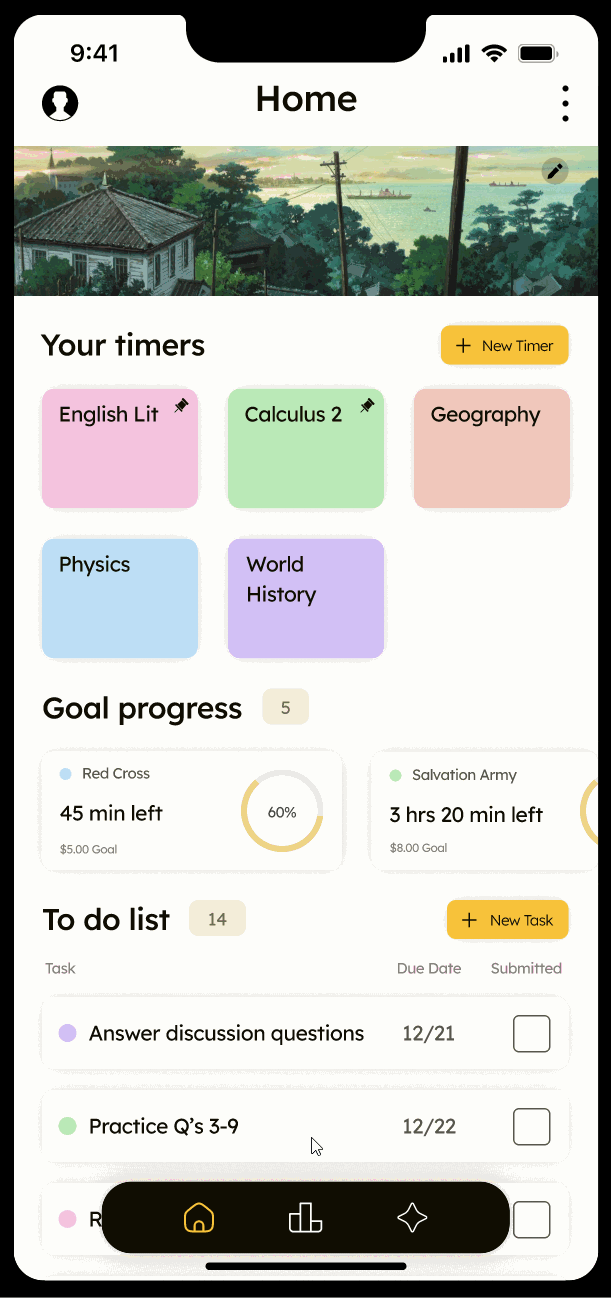Balance: Time Management App
Type: University, Solo • Role: UX Designer + Researcher • Length: 5 weeks • Programs Used: Figma
.png)
Problem: How might we better design a study timer app so that users are more likely to continue using it?
Timer-based study methods are a well-known method used by students all over the world, such as the famous Pomodoro method.
🤔 Unfortunately, without external stimuli, the only thing that keeps people willing to use screen time management apps is their self-discipline, which is typically finite and non-tangible.
Though there are apps that offer incentives (sometimes gamified), many of them struggle with long-term user retention due to a lack of real-world impact to encourage users to continue limiting their screen time.
🤔 Once the deadline is gone or the game has been completed, there's no more stimuli.
"... analyses revealed that... in this college population... feeling in control of the situation is related to lower levels of stress.” (Mirsa)
The answer: a gamified charity function!

💡The Charity function allows a necessary task (studying) to become one that can carries meaning outside of the user's everyday life
💡Due to the nature of global wicked problems, there is a constant need for charity, thus a never-ending source of external motivators for users
💡Users are able to monitor the screen time usage of both themselves and their friends
💡They can hold each other accountable or compete with each other
🧑🎓 Ultimately, the goal of the app is to allow users to balance their day-to-day life through time management, while also being able to connect to and support a greater cause
User Research - Interview 1
Planning Information:
📍 Location: Me Place Study Cafe, Seoul, Korea
🕞 When: October 30th, 15:30 / 3:30pm
🗣️ Interviewee: JK, a 4th year university student
✍️ Interviewer: Lena Schiffler

Interview Insight + Key Quotes
🗣️ "Once I start, it's easy to keep going. But it's not easy to start... [My study method is] a last resort kind of thing."
⚠️ Problem TLDR: Starting work at the last minute, often fear/stress is what motivates them to finish.
✏️ My first interviewee noted that she had trouble starting her work. Additionally, two types of motivators for her to start her work were identified:
-
Positive (self-satisfaction)
-
Negative (fear or stress).
✏️ The positive motivator results from proactive action and acts as a type of initial inertia and helps them to continue working. This was their preferred motivator.
✏️ The negative motivator results from procrastination and becoming intensely motivated at the last minute to work due to their fear or stress of the deadline.
✏️ My goal then is to implement app features that encourage the positive motivator (self-satisfaction).
💡Opportunity area: Simplify tasks (to-do list, project or class based timers), add notifications/reminders
User Research - Interview 2
Planning Information:
📍 Location: The Coffee Bean Cafe, Seoul, Korea
🕞 When: November 5th, 16:00 / 4:00pm
🗣️ Interviewee: HL, a 4th year university student
✍️ Interviewer: Lena Schiffler

Interview 2 Key Quotes + Insights
🗣️ "This probably could have taken me two hours but it took me four."
⚠️ Problem TLDR: Pseudo procrastination due to lack of study breaks causes the workload to take much longer to complete.
✏️ My second interviewee identified her main issue as not having an effective use of time, and pseudo-procrastinating.
✏️ The interviewee's stress is self-imposed and is then utilized as a motivating force to get everything done in one shot.
✏️ For example, she would wait until a day before the assignment is due, but then spend all day completing the assignment.
✏️ Though the procrastination is done at a calculated rate that "budgets" enough time to finish the work, the work time itself becomes arduous and long, and unplanned breaks end up happening often.
💡Opportunity area: Introduce planning tools, drawing inspiration from apps like Notion, and add study breaks into the timer app.
User Journey Map

User Persona

User Flow Chart

Sketches


Low Fidelity Prototype

High Fidelity Prototype (Creating a timer)

High Fidelity Prototype (Other main screens)

My takeaways
One thing I'd love to do if I continued this project would be to test a prototype of this app compared to other study timer apps to see if this would in fact increase retention.
When designing in the future, I would also like to consider global perspectives.
I redesigned this project in a design seminar course when studying abroad at Seoul National University, and a local student I was trading feedback with told me a very interesting tidbit.
They mentioned that similar apps exist in Korea due to their strong study culture in which the app is more competition based and community-oriented.
This was so, so interesting to me because I approached the design problem from a Western perspective, in which studying is an individualistic task, though sometimes done with a friend or two. Because of this insight, I ended up adding the leaderboard feature.